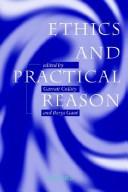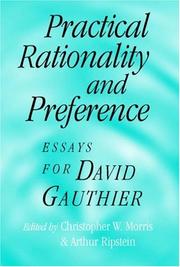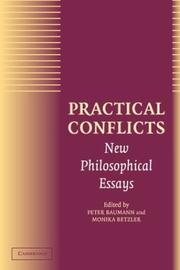| Listing 1 - 10 of 96 | << page >> |
Sort by
|
Book
ISBN: 9780198712886 019871288X Year: 2014 Publisher: Oxford Oxford University Press
Abstract | Keywords | Export | Availability | Bookmark
 Loading...
Loading...Choose an application
- Reference Manager
- EndNote
- RefWorks (Direct export to RefWorks)
Can we prove the necessity of our best physical theories by rational means, without appeal to experience? This book recounts a few ingenious attempts to derive physical theories by reason only, beginning with Descartes' geometric construction of the world, and finishing with recent derivations of quantum mechanics from natural axioms. Deductions based on theological, metaphysical, or transcendental arguments are worth remembering for the ways they motivated and structured physical theory, even though we would now criticize their excessive confidence in the power of the mind. Other deductions more modestly relied on criteria for the comprehensibility of nature, including forms of measurability, causality, homogeneity, and correspondence. The central thesis of this book is that such criteria, when properly applied to idealized systems, effectively determine some of our most important theories as well as the mathematical character of the laws of physics. The relevant arguments are not purely rational, because only experience can tell us to which extent nature is comprehensible in a given way. Nor do they block the possibility of ever more varied forms of comprehensibility. They nonetheless suggest the inevitability of much of our theoretical physics.
Physics --- Practical reason --- Practical rationality --- Practical reasoning --- Rationality, Practical --- Reasoning, Practical --- Reason --- Philosophy --- History --- History. --- Methodology.

Abstract | Keywords | Export | Availability | Bookmark
 Loading...
Loading...Choose an application
- Reference Manager
- EndNote
- RefWorks (Direct export to RefWorks)
Ethics --- Practical reason --- Practical rationality --- Practical reasoning --- Rationality, Practical --- Reasoning, Practical --- Reason
Book
ISBN: 3110323540 9783110323542 3868381821 9783868381825 311032301X 9783110323016 9783868381825 9783110323016 1299722431 Year: 2013 Volume: v. 2 Publisher: Frankfurt Ontos
Abstract | Keywords | Export | Availability | Bookmark
 Loading...
Loading...Choose an application
- Reference Manager
- EndNote
- RefWorks (Direct export to RefWorks)
Having its seeds in the 2nd International Lauener Symposium held in honour of Dagfinn Føllesdal, the present collection contains a rich, kaleidoscopic ensemble of previously unpublished contributions by leading authors, representing diverse approaches to a variety of philosophical themes on which Føllesdal has had a longstanding, formative impact. Føllesdal himself contributes an orientating essay -continuing to develop his pioneering theory of reference -as well as in-depth commentaries on each of the other authors' elaborated papers plus candid answers in the added interview. The volume assembles a wealth of original articles containing in part direct discussions of Føllesdal's work and covering a broad range of topics like subjectivity, intersubjectivity, objectivity, rationality, logics and mathematics, choice theory, values, modalities, intentionality, individuation, perception, communication, meaning, reference, the slingshot, one- and two-sorted semantics, evidence, neuropsychology, space and time, science and society, methodology, fallibilism, the relative a priori, justification, holism, the life-world, reflective equilibrium, empathy, and ethics. Moreover the book includes an incisive memoir of Føllesdal the philosopher as well as a spanning interview with him, which are both critically directing toward Føllesdal's subtly differentiated understanding of the dynamic philosophical horizon he shares in. With contributions from Dagfinn Føllesdal, Charles Parsons, Patrick Suppes, Jon Elster, John Perry, Michael Friedman, Dag Prawitz, Wilhelm K. Essler, David Woodruff Smith, Olav Gjelsvik, Graciela De Pierris, Nils Roll-Hansen, Christian Beyer, Øystein Linnebo, Michael Frauchiger.
Practical reason. --- Practical rationality --- Practical reasoning --- Rationality, Practical --- Reasoning, Practical --- Reason
Book
ISBN: 128362902X 0739172271 9786613941473 9780739172278 0739172263 9780739172261 9781283629027 Year: 2012 Publisher: Lanham, MD : Lexington Books,
Abstract | Keywords | Export | Availability | Bookmark
 Loading...
Loading...Choose an application
- Reference Manager
- EndNote
- RefWorks (Direct export to RefWorks)
This book treats practical and political reasoning as an active engagement with the world and other people; it cannot be understood as exclusively cognitive and this is seen as a virtue rather than a deficiency. Informal, emotional, characterological, aesthetic and interactional aspects of thought can be constituents of reasonable arguing. The work examines key capacities connected with argumentation, in a variety of fields from professional and medical ethics to work organization and the practice of art.
Practical reason. --- Reason. --- Mind --- Intellect --- Rationalism --- Practical rationality --- Practical reasoning --- Rationality, Practical --- Reasoning, Practical --- Reason
Book
ISBN: 144386966X 9781443869669 1443846260 9781443846264 9781443846264 1443846260 Year: 2013 Publisher: Newcastle upon Tyne, England : Cambridge Scholars Publishing,
Abstract | Keywords | Export | Availability | Bookmark
 Loading...
Loading...Choose an application
- Reference Manager
- EndNote
- RefWorks (Direct export to RefWorks)
Resistance used to mean irrational and reactionary behaviour, assuming that rationality resides on the side of progress and its parties. The end of the Cold War allows us to drop ideological and prejudicial analysis. Indeed, we recognise that resistance is a historical constant, and its relation to rationality or irrationality is not predetermined. This volume asks: to what extent are social scientific conceptions of 'resistances' sui generis, or borrowed from natural sciences by metaphor an...
Practical reason. --- Practical rationality --- Practical reasoning --- Rationality, Practical --- Reasoning, Practical --- Reason
Book
ISBN: 0191748226 0191059056 0191059064 Year: 2019 Publisher: Oxford : Oxford University Press,
Abstract | Keywords | Export | Availability | Bookmark
 Loading...
Loading...Choose an application
- Reference Manager
- EndNote
- RefWorks (Direct export to RefWorks)
This text takes up a central question in jurisprudence: What difference can law make to normative reasons relevant to our actions? Following a critical examination of two competing models, an exclusionary model and a weighing model, Gur proposes a third way that aims to capture the strengths of both of these models while avoiding their pitfalls.
Law --- Practical reason. --- Law (Philosophical concept) --- Philosophy. --- Law (Philosophy) --- Philosophy --- Practical rationality --- Practical reasoning --- Rationality, Practical --- Reasoning, Practical --- Reason --- Jurisprudence
Book
ISBN: 1283436167 9786613436160 1443834246 9781443834247 9781283436168 9781443833424 1443833428 Year: 2011 Publisher: Newcastle upon Tyne Cambridge Scholars Pub.
Abstract | Keywords | Export | Availability | Bookmark
 Loading...
Loading...Choose an application
- Reference Manager
- EndNote
- RefWorks (Direct export to RefWorks)
In Beyond Rationality: Contemporary Issues, scholars from a variety of disciplines explore the concept of ""irrationality"" in today's increasingly complex world. Combining both theory and practice, this is essential reading for anyone wishing to understand such diverse puzzles as why citizens often readily support dictatorships, how terrorists ""reason,"" and why seemingly rational people often make irrational choices.
Irrationalism (Philosophy) --- Practical reason --- Practical rationality --- Practical reasoning --- Rationality, Practical --- Reasoning, Practical --- Reason --- Absurd (Philosophy) --- Belief and doubt --- Philosophy --- Rationalism

ISBN: 0511570805 0521781841 0521038847 Year: 2001 Publisher: Cambridge : Cambridge University Press,
Abstract | Keywords | Export | Availability | Bookmark
 Loading...
Loading...Choose an application
- Reference Manager
- EndNote
- RefWorks (Direct export to RefWorks)
What are preferences and are they reasons for action? Is it rational to cooperate with others even if that entails acting against one's preferences? The dominant position in philosophy on the topic of practical rationality is that one acts so as to maximize the satisfaction of one's preferences. This view is most closely associated with the work of David Gauthier, and in this collection of essays some of the most innovative philosophers working in this field explore the controversies surrounding Gauthier's position. Several essays argue against influential conceptions of preference, while others suggest that received conceptions of rational action misidentify the normative significance of rules and practices. This collection will be of particular interest to philosophers of social theory and to reflective social scientists in such fields as economics, political science and psychology.
Practical reason. --- Preferences (Philosophy) --- Philosophy --- Practical rationality --- Practical reasoning --- Rationality, Practical --- Reasoning, Practical --- Reason --- Gauthier, David P. --- Arts and Humanities
Book
ISBN: 9783110981339 3110981335 9783110995961 Year: 2024 Publisher: Berlin, Germany : Walter de Gruyter GmbH, Berlin
Abstract | Keywords | Export | Availability | Bookmark
 Loading...
Loading...Choose an application
- Reference Manager
- EndNote
- RefWorks (Direct export to RefWorks)
The idea that there is a distinctively practical use of reason, and correspondingly a distinctively practical form of knowledge, unites many otherwise diverse voices in the history of practical philosophy: from Aristotle to Kant, from Rousseau to Marx, from Hegel to G.E.M. Anscombe, and many others. This volume gathers works by scholars who take inspiration from these and many other historical figures in order to deepen our systematic understanding of questions raised by their work that still are, or ought to be, at the center of contemporary philosophical debate: the form and nature of practical reasoning, agential self-consciousness or practical knowledge, how knowledge of the good relates to our motivational capacity, and the shape of philosophical thinking about sound forms of living together. Accordingly, the volume is divided into three parts: action theory, meta-ethics, and political philosophy. This fusion of perspectives delivers novel possibilities not only for answering the systematic questions outlined above, but also for understanding both what unifies and distinguishes those historical voices that have sought to articulate the concept of practical reason. “This fascinating volume brings out the richness and profundity of an oft-neglected approach to understanding human agency, one that foregrounds action as itself an exercise of reason. Essays on ethics, mind, action, and political philosophy explore the history, substance, and implications of this idea, cutting across while also revealing the unity underlying various parts of philosophy that are typically treated separately.” – Eric Marcus, Auburn University
Free will and determinism. --- Liberty. --- moral motivation. --- practical knowledge. --- practical reasoning. --- practical wisdom. --- Free will and determinism --- Liberty

ISBN: 0521012104 0521812712 1107144450 0511184379 0511166206 0511312970 0511616406 1280437332 0511164270 0511165072 9780511166204 9780511164279 9780521812719 9780521012102 9780511616402 9781280437335 Year: 2004 Publisher: Cambridge Cambridge University Press
Abstract | Keywords | Export | Availability | Bookmark
 Loading...
Loading...Choose an application
- Reference Manager
- EndNote
- RefWorks (Direct export to RefWorks)
Practical conflicts pervade human life. Agents have many different desires, goals, and commitments, all of which can come into conflict with each other. How can practical reasoning help to resolve these practical conflicts? In this collection of essays a distinguished roster of philosophers analyse the diverse forms of practical conflict. Their aim is to establish an understanding of the sources of these conflicts, to investigate the challenge they pose to an adequate conception of practical reasoning, and to assess the degree to which that challenge can be met. These essays will serve as a major resource for students of philosophy but will also interest students and professionals in related fields of the social sciences such as psychology, political science, sociology and economics.
Philosophical anthropology --- Practical reason --- Conflict (Psychology) --- Practical rationality --- Practical reasoning --- Rationality, Practical --- Reasoning, Practical --- Intrapsychic conflict --- Reason --- Adjustment (Psychology) --- Motivation (Psychology) --- Arts and Humanities --- Philosophy --- Practical reason.
| Listing 1 - 10 of 96 | << page >> |
Sort by
|

 Search
Search Feedback
Feedback About UniCat
About UniCat  Help
Help News
News